Father and the Cow
Part One
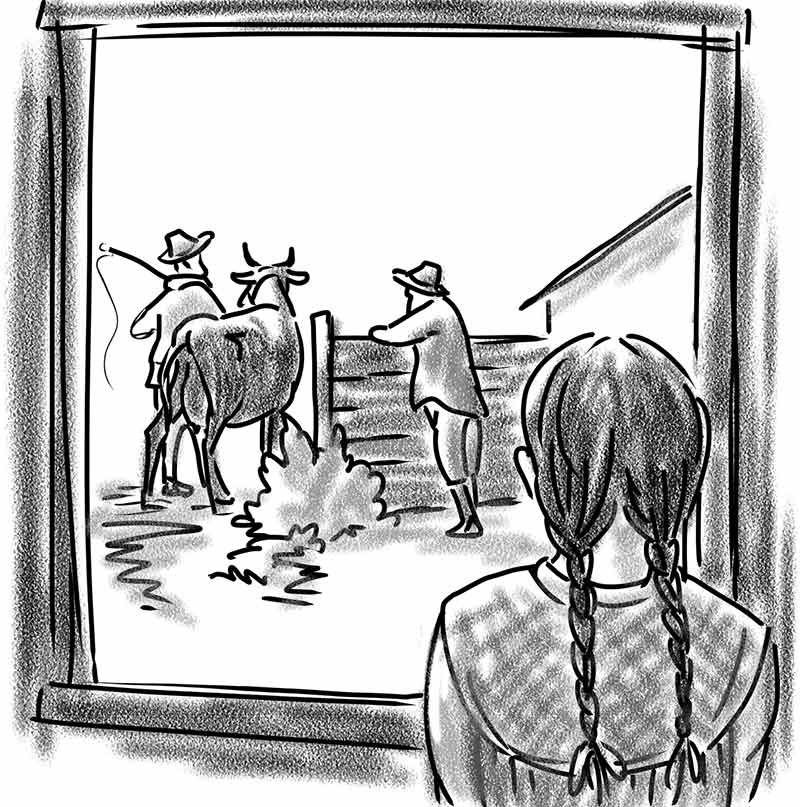
Dorothea watched from the house as the stranger led away Meg, their big Swiss cow. “Meg is our nicest cow,” she muttered to herself. “Why didn’t Father sell Susie instead? She always stomps and makes the most noise!” Mother was sitting nearby at her spinning wheel, but she didn’t say anything. Dorothea knew she shouldn’t complain, but the anger inside just had to come out. “I don’t like it!”
Big brother Albert wasn’t pleased either. “Do you know how much money Father got from the cow?” he asked, bursting through the door. “Enough to pay for coal for the whole winter, and the grocery bill besides!” Mother looked up from her spinning and smiled, but they all knew it wasn’t good news. Father was going away on a trip and he was taking all that money with him. Trina and Valerie, who were busy carding wool for Mother, looked at each other. “I say that’s awfully selfish!” Albert said, for all of them. But Mother didn’t agree.
“Children, don’t fret about what your earthly Father does. Your heavenly Father knows all about it and He will surely take care of our needs,” she said in her soft quiet voice. Then she went back to her spinning.
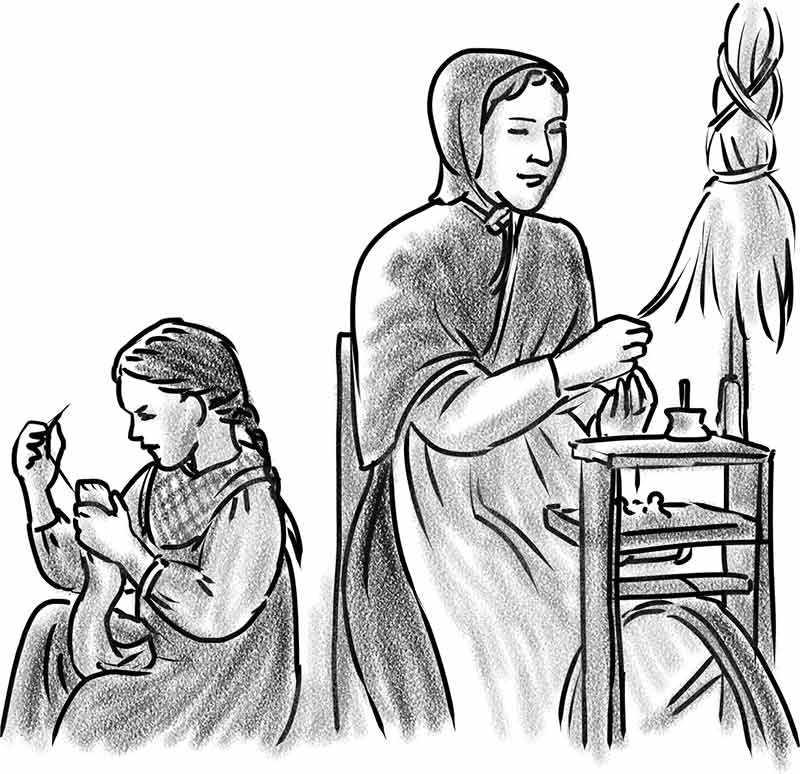
Dorothea knew that was supposed to be the end of the matter, but she wasn’t happy. She sat and darned socks for her brothers, but inside her thoughts stomped angrily like Susie’s feet when she didn’t want to be milked. How could Mother be so peaceful when she knew they didn’t have any money to live on? Father didn’t care. Often he would take the last farthing in the house and go to the tavern to drink. And when he was drunk, he was always more rude and impatient than usual. Sometimes he would throw things and scream at them. Dorothea was afraid of Father when he was drunk. Now he was taking a trip “abroad,” he had told them. Dorothea didn’t know where “abroad” was, but she hoped it was far away from their little Swiss town. It would be better at home without Father. Her oldest sister, Lisa, was working out now. She always brought home a handful of coins every Saturday. Without Father around to waste it, they could use it to buy bread and coal. Maybe even some meat. It had been a long time since Dorothea had tasted any meat, and she licked her lips just thinking about it.
The sound of coal being poured into the hopper made Dorothea look up. Albert and David were starting on the evening chores. Lisa would be home soon, and then it would be time for supper. Trina must have thought the same thing. “I’ll stoke up the fire and heat the soup,” she said, setting down her work. “Dori, check and see if we have any cheese left to go with our bread.”
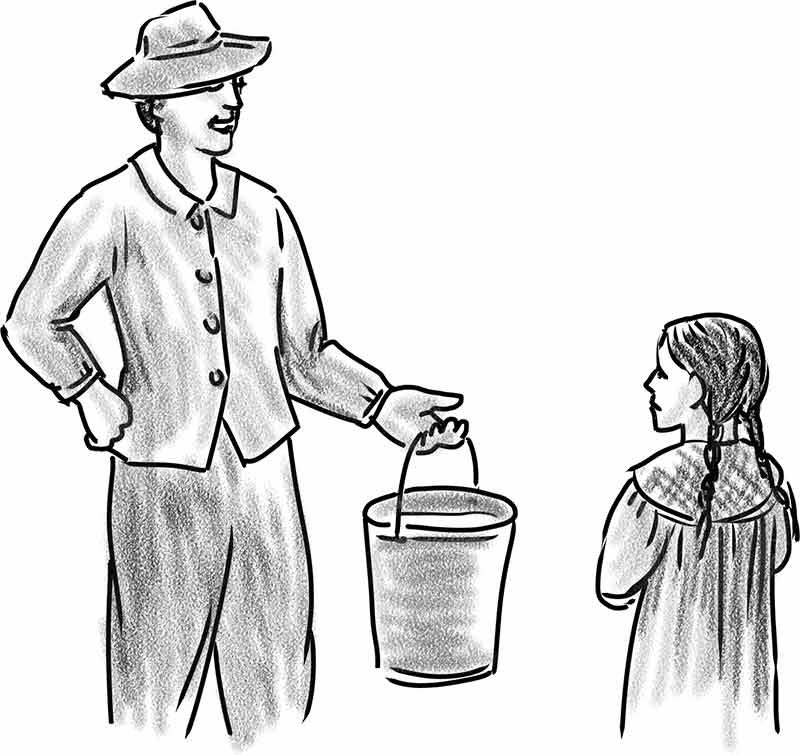
Dorothea was glad to put down her darning and run to the cellar. She had almost forgotten about Father and the cow, until she met David bringing in the milk. “With only one cow now, it doesn’t take long,” he said, with a little laugh. “At least Susie didn’t kick the pail over tonight. As Mother says, there is always something to be thankful for!” Dorothea tried to smile, but she could only think of the little bit of cheese left in the crock and how they wouldn’t be making more for awhile. Not with only one cow.
Lisa was rosy-faced and a bit excited when she got home late. “I met up with the clergyman today,” she told Mother, as she took off her coat and began to warm her fingers by the stove. She looked around the small cozy room where they were all gathered to eat. “Father’s out, I guess?”
“Yes, dear,” Mother said, quietly.
“Hasn’t been seen since he sold Meg,” Albert muttered, around a bite of bread. “Probably out drinking again.”
“Well,” continued Lisa, hardly paying attention. “I don’t know how the clergyman found out, but he was quite upset about Father.”
“You mean, Father going away?” David asked.
“No, Father leaving us without any money,” Lisa said. “He said it was neglect and cruelty and should be reported.”
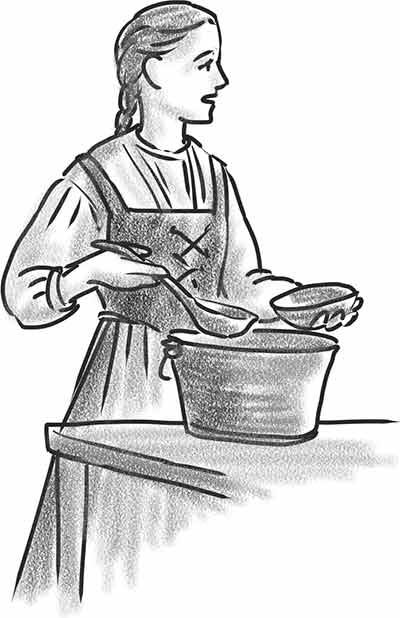
“How did he find that out?” Trina asked. She stopped ladling out the soup and stared at her oldest sister. “You didn’t tell him, did you?” Dorothea felt a cold prickle go up her back.
“Of course not!” Lisa replied, and she looked tenderly at Mother. “I don’t know how he knew, but I told him that you never talk badly about Father and I wouldn’t either. As you always say, I told him that God will work everything out for our good. So we don’t need to be troubled by what our earthly father does, but receive everything from our heavenly Father. I told him that even if God allows us to not have a house to stay in, He will take care of us. Like you have told us so often, ‘As long as you pray, then you will never need to beg.’ ”
Mother nodded and smiled at Lisa with shining eyes. Dorothea snuggled in between them and leaned her head on Mother’s strong shoulder.
“What did the clergyman say then?” asked David, putting some more coal into the fire.
“He told me he couldn’t agree. He said that God let Napoleon do many things that were not right, and it would likely turn out very badly for us if we didn’t do something. Then he asked me, ‘Who can your mother rely on for help?’”
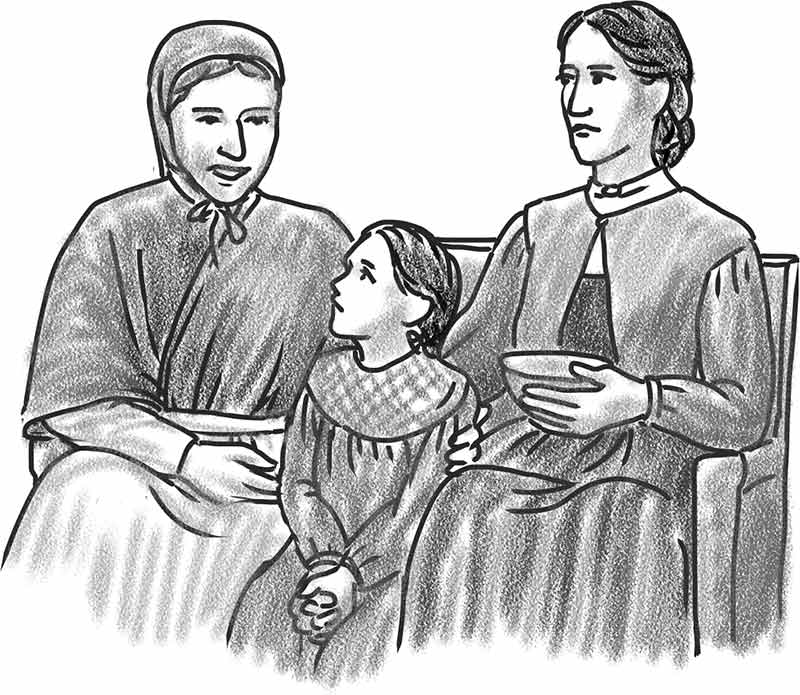
Dorothea looked up at Mother’s kind, patient face. She knew the answer even before Lisa spoke. “I said, ‘Mother always relies on God alone. She never tells us how God will take care of things, but she always knows He will.’ ”
“He probably wasn’t convinced,” said Alfred.
“No, because after that he talked about needing to use our reason, because God gave us minds to think.”
Dorothea felt Mother’s deep sigh. “Oh, children,” she said, earnestly, “follow my example. Don’t turn to people for help, but to God. The person who trusts in human reasoning and leans on the support of people, instead of on God, will be unhappy.”
“You are right, Mother,” admitted Trina, looking into the empty soup pot. “All afternoon I was trying to think about what to do to help with the bills, and it gave me a headache. The Bible says nothing about trying to solve our problems, and it really is a waste of time.”
“That’s what I tried tell him,” Lisa said. “I said that the Bible promises us, ‘Whosoever believeth on God shall not be ashamed.’ (Romans 10:11)”
“It also says, ‘Casting all your care upon him; for he careth for you,’ (1 Peter 5:7)” quoted Valerie thoughtfully.
“That is right,” said Mother, stroking Dorothea’s hair. “With your father leaving and only one milk cow to provide for us, it is not time to worry. If we look to God in confidence, trusting Him to take care of us, we will surely get help just at the right time.”
Dorothea’s eyes start to shut. She felt safe and sleepy. She was glad when David carried her off to bed.
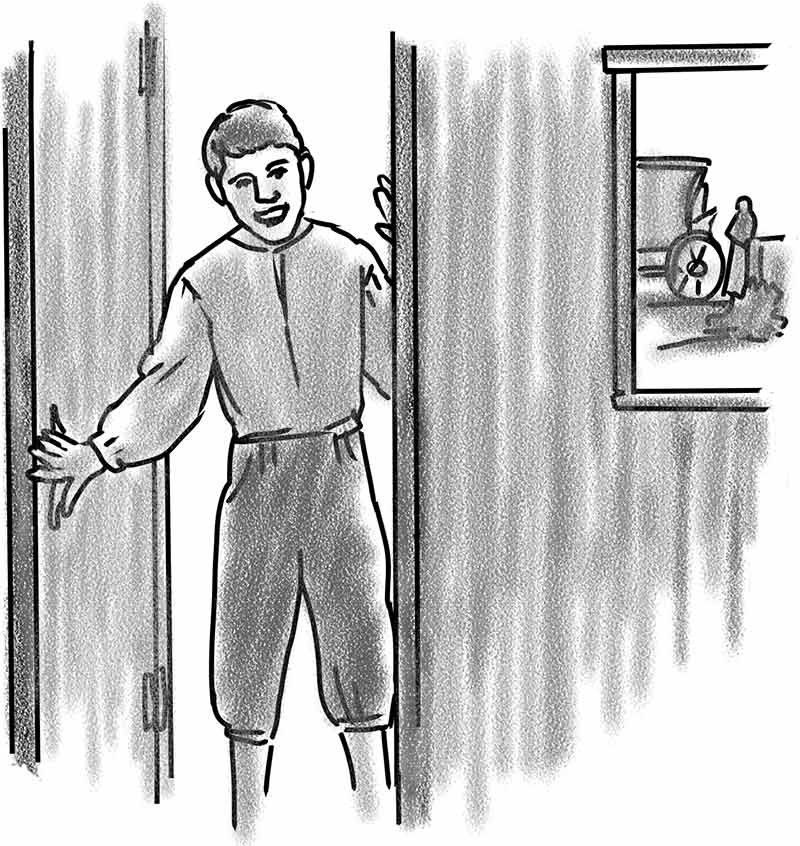
It was only a few days later that Alfred burst through the door with a message for Mother. Dorothea was helping Trina chop vegetables, but she stopped to listen. “Mr. Farner is outside in his carriage. He says he wants to speak with you about something. I think it is important!” Mother put on her shawl and hurried outside without saying a word.
Dorothea was curious. She stood at the window with her sisters and watched Alfred and Mother standing by the carriage. What could their rich neighbor want? Sometimes he hired the boys for work, or bought some of their spinning. “Maybe God sent Mr. Farner over because we need the money,” Valerie whispered. “Let’s see what Alfred says - he looks excited about something,” said Trina, hurrying to open the door.
“You’ll never guess what Mr. Farner said!” Alfred grinned at his sisters. He hadn’t been so happy since Meg was sold, so Dorothea knew is must be good news. “Tell us!” she said, impatiently. “Mr. Farner is loaning us enough money to buy a new cow!” he announced. “When he heard that we only had Susie left, he knew we would need another cow to pay the bills while Father was away.”
“That’s wonderful!” Trina exclaimed. “I wonder where we’ll find a cow?”
“Oh, the dairyman has connections,” Alfred said, confidently. “Mother is going to ask him tonight if he knows of good milker for sale.”
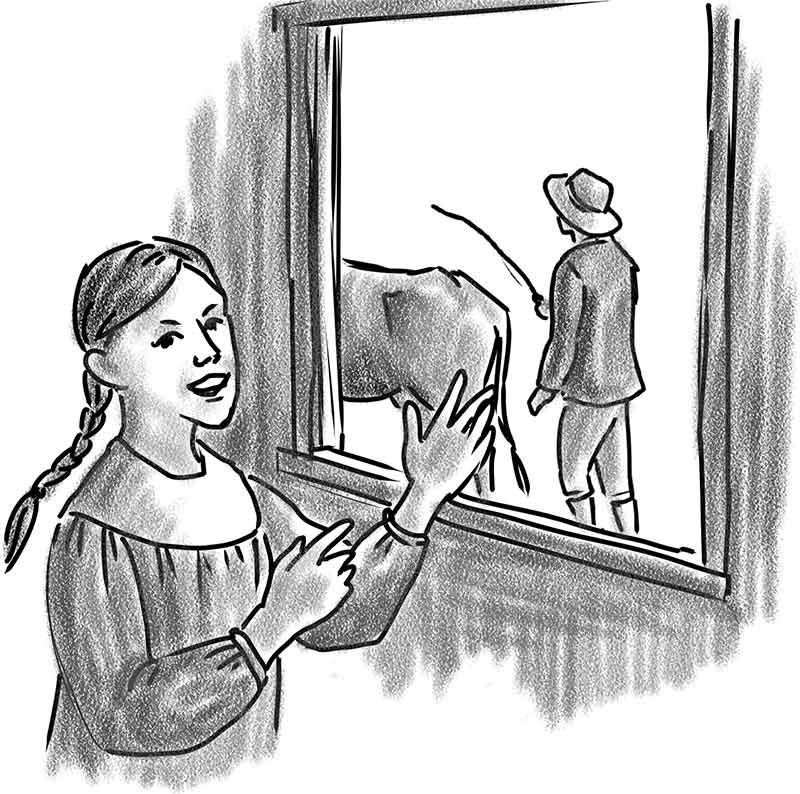
And so it was that Dorothea stood at the window the very next evening and watched David and Alfred bring home their new cow. “She’s brown, Mother,” she called excitedly, when they led her by the house. “She looks like Meg, but she has smaller horns. Can I run out and watch them milk her?”
“Let’s go together,” Mother said, rising from her work. “I’m a bit excited myself! Isn’t our heavenly Father so good to provide for us?” Dorothea skipped ahead and opened the barn door for Mother. The cow turned her dark eyes to look at them and then started peacefully chewing on hay as Alfred sat down to milk.
“The man said she’s gentle, and she came home easily enough,” David said, patting her smooth side. “It looks like she’ll make a perfect replacement for Meg. What shall we call her, Mother?”
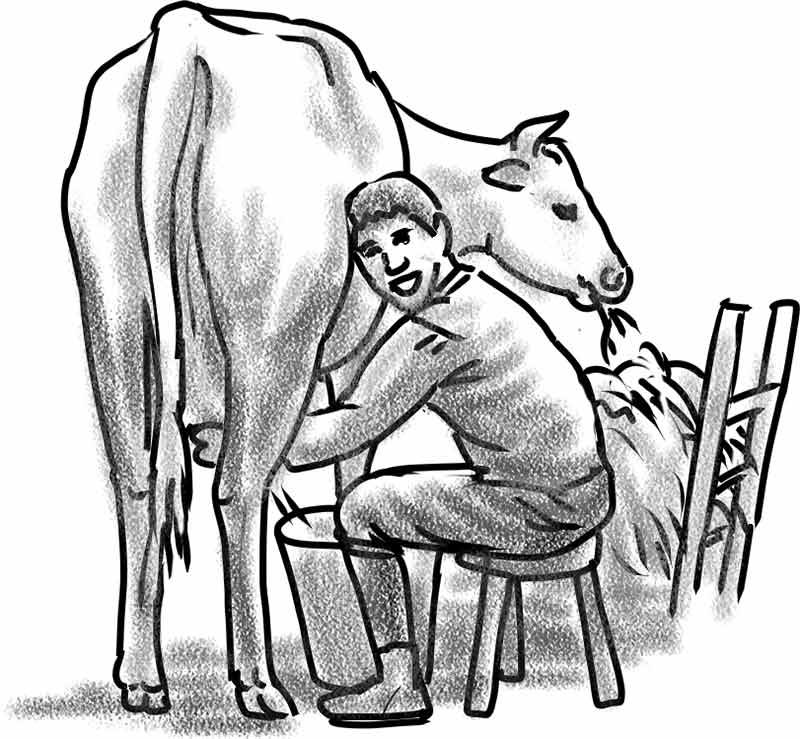
“How about ‘Blessing’?” Mother asked, smiling down at Dorothea. “It was a blessing for Mr. Farner to loan us the money, and a blessing to have such a fine cow to provide for our needs.”
“Look how much milk she gave tonight!” Alfred said, holding up the brimming pail of milk. “We’ll be able to make cheese and butter and sell lots to the dairyman, too!”
“The money will first go to pay off Mr. Farner,” Mother reminded him. “But I’m sure that God will provide for all our needs, too. For we know that ‘The blessing of the Lord, it maketh rich, and he addeth no sorrow with it.’ (Proverbs 10:22)”
See also: Part Two